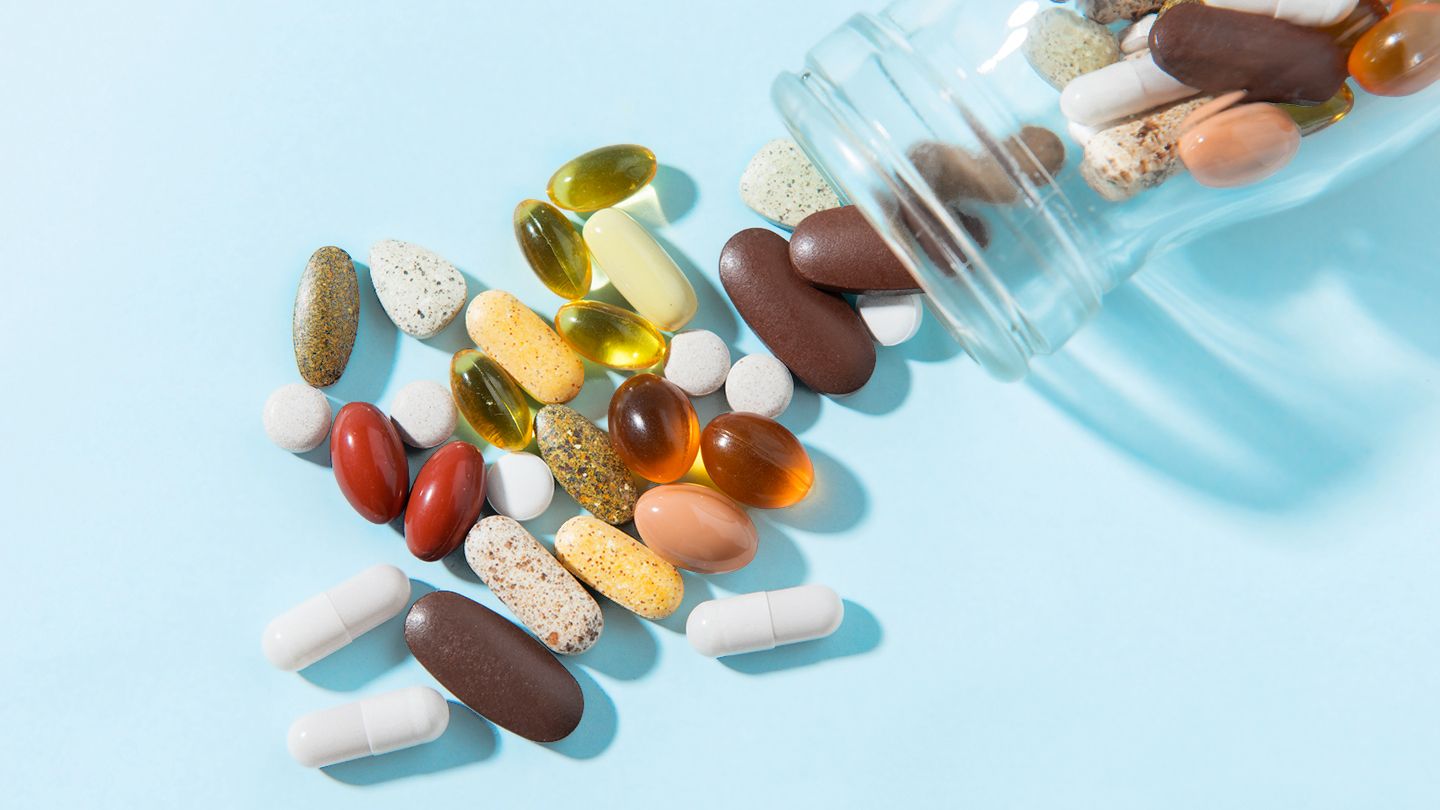Note: The U.S. Food and Drug Administration (FDA) does not approve supplements for safety or effectiveness. Talk to a healthcare professional about whether a supplement is the right fit for your individual health, and about any potential drug interactions or safety concerns.
If you are currently taking supplements, you are not alone. According to the Centers for Disease Control and Prevention, during 2017–2018, nearly 58 percent of people aged 20 and over took a dietary supplement within the past 30 days. But while supplements are often seen as a method to ensure you meet your daily nutritional needs, they can create problems if you’re not careful. Like drugs, dietary supplements can impact your body’s functions, which may lead to adverse effects.
Supplementing guidelines are tricky and ever-evolving, and the supplements consumers take may not be the cure-all marketers often promise. So, how do you know if you’re overdoing it with the supplements? Read on to find out.
What Are the Potential Health Benefits of Supplements?
“[In general], a supplement is something you’re not getting enough of through food,” says Rohit Moghe, PharmD, CDCES, a pharmacist with Trinity Health Mid-Atlantic in Philadelphia, and member of the American College of Lifestyle Medicine (ACLM).
Many people turn to gummies, capsules, powders, tinctures, and even saline solutions delivered via a needle (IV therapy) to fill in these nutrient gaps.
In the Dietary Supplement Health and Education Act of 1994 (DSHEA), Congress defined supplements as products (other than tobacco) that are intended to supplement the diet and contain one or more dietary ingredients (including vitamins, minerals, herbs, botanicals, amino acids, or other substances) or their constituents, and are intended to be taken by mouth as a pill, capsule, tablet, or liquid and are labeled as a dietary supplement.
While many people can meet their nutrient needs through diet, others — like those with higher requirements — may benefit from supplements. These can include children, adolescents, pregnant and lactating people, and those who struggle to absorb nutrients (older adults, people living with obesity, and people with chronic conditions). It can also impact those who follow a restrictive diet (like vegans and vegetarians), according to an article published in January 2018 in the journal Nutrients.
For example, a vitamin B12 supplement may suit older adults and people who follow a vegan or vegetarian diet. Vitamin B12 helps keep your blood and nerve cells healthy and plays a vital role in making DNA, per the National Institutes of Health (NIH). It’s found naturally in animal foods, which means vegans and vegetarians may not get enough through diet alone. According to the NIH, many people over age 50 may also be deficient in vitamin B12 because they don’t have enough hydrochloric acid in their stomachs to absorb it. Therefore, both groups might benefit from a vitamin B12 supplement.
What Are the Risks of Supplements?
A common concern about supplements is that the industry, in general, is under-regulated. Unlike medications, supplements don’t have to be approved by the FDA before they’re sold or marketed.
New legislation, introduced by Senate Majority Whip Dick Durbin, a Democrat from Illinois, aims to improve the safety of dietary supplements by requiring manufacturers to list their products with the FDA under the Dietary Supplement Listing Act of 2024. The legislation, which refers to the DSHEA, points out that in 1994, about 4,000 dietary supplements were marketed in the United States. The bill was referred to the Committee on Health, Education, Labor, and Pensions, yet did not proceed and has not yet been reintroduced. However, the industry has boomed, and now 100,000 products are available.
In the meantime, consumers can’t be sure the supplements they’re taking are safe or effective. Even if a supplement is considered generally safe, it may not be safe for you. “Most vitamins and minerals have a risk of harm with [higher] dosages, and the risk is based on the individual nutrient and patient,” says Ravi Tripathi, MD, chief health information officer and professor of anesthesiology at Ross Heart Hospital at The Ohio State University Wexner Medical Center in Columbus. When it comes to supplements and risks, “there is no one size that fits all,” he says.
Supplements can pose risks even in otherwise healthy people. According to the NIH, you’re more likely to have side effects from dietary supplements if you take them at high doses or use many different supplements.
- Headache
- Dizziness
- Severe weakness
- Nausea
- Tremor
- Constipation or diarrhea
- Inability to exercise or perform routine tasks
5 Common Supplements People Tend to Overdo
While supplements can be helpful for some individuals, it is essential to speak to your healthcare provider about what is best for you and follow the manufacturer’s recommendations on packaging. To that end, here are five supplements that people may overuse:
1. Vitamin D
Why it’s good for you: Vitamin D (also known as the “sunshine vitamin”) helps your body absorb calcium, making it a key nutrient for bone health. Your body also needs vitamin D to carry messages between your brain and your body and fight off bacteria and viruses, according to the NIH.
Risks: Very high vitamin D levels can cause nausea, vomiting, muscle weakness, pain, loss of appetite, dehydration, and kidney stones, per the NIH.
2. Iron
Why it’s good for you: Iron is a mineral your body needs to make hemoglobin, a protein in red blood cells that carries oxygen throughout your body. It also helps your body make hormones.
Risks: Getting too much iron can cause gastrointestinal symptoms like constipation, nausea, vomiting, abdominal pain, and diarrhea, per the NIH. Overdosing on iron can also lead to inflammation of the stomach lining and ulcers. Although rare, extremely high doses of iron (in the hundreds or thousands of milligrams) can even cause organ failure, coma, convulsions, and death, according to the NIH.
3. Vitamin A
Why it’s good for you: According to the NIH, vitamin A is essential for vision, immune health, reproduction, growth, and development.
Why you might be overdoing it: It’s pretty easy for most people to score plenty of vitamin A. If you eat cereal for breakfast, carrots or sweet potatoes at lunch, and then pop a supplement for eye health, you’ve probably gone over the recommended amount, notes the Cleveland Clinic.
Risks: High vitamin A levels can cause severe headaches, blurred vision, nausea, dizziness, muscle aches, and coordination issues, per the NIH.
4. Vitamin C
Why you might be overdoing it: In 2022, the Council for Responsible Nutrition survey found that vitamin C supplementing had seen a big boost since the pandemic. However, most people can get enough vitamin C through food. In fact, 1 cup of strawberries, chopped red pepper, or broccoli will provide the daily amount needed, per the Mayo Clinic.
5. Calcium
Why it’s good for you: Calcium is a mineral that builds and maintains strong bones. It also plays a role in nerve function, circulation, and hormone release, according to the NIH.
Why you might be overdoing it: You may be tempted to load up on calcium supplements to protect your bones, but according to the Cleveland Clinic, it’s surprisingly easy to overdo it, especially if you’re already getting calcium from your food.
Risks: Excess calcium has been linked to constipation, kidney stones, kidney failure, heart problems, and cognitive issues, according to the Cleveland Clinic.
How to Talk to Your Doctor About Supplements
Experts often recommend speaking with your doctor before trying a supplement. Unfortunately, many physicians and nurse practitioners aren’t as knowledgeable in this area. “I find many [healthcare professionals] are grossly unprepared to answer their patients’ questions, and they wind up telling them that supplements are a waste of money, when maybe there’s a product that may actually work for your intended use,” Dr. Moghe says.
If you’re interested in adding a supplement to your diet, Moghe suggests talking with a physician trained in integrative medicine or nutritional medicine, a pharmacist, a naturopath, or a registered dietitian. You can check the directories of the National Board of Physician Nutrition Specialists and the American Board of Physician Specialties to find a healthcare professional who works for your needs.
Read the full article here




